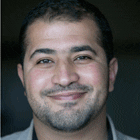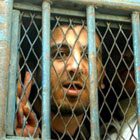29 Jan 2011 | Middle East and North Africa, News
 The Egyptian government has cut mobile telephone and internet services, Index on Censorship’s Egypt regional editor Ashraf Khalil reports on how the information vacuum affected yesterday’s “day of rage”
The Egyptian government has cut mobile telephone and internet services, Index on Censorship’s Egypt regional editor Ashraf Khalil reports on how the information vacuum affected yesterday’s “day of rage”
The cell phones started working this morning again, although I’m not sure they’ll stay that way. The internet (as of 7pm local time) was still blocked. The fact that one but not the other has been restored perhaps indicates that the government views the internet as a larger threat than phone calls and text messages.
Whatever the logic, it’s worth noting that all these government attempts to restrict communications did very little to hinder the protesters yesterday and today.
The #Jan25 Day of Rage that kicked off the current waves of civil unrest rocking President Hosni Mubarak’s government DID employ Facebook, Twitter and text messaging as crucial tools. Last minute notifications on where to gather went out electronically at first. And all through the day on 25 January, protesters used Twitter to coordinate, offer each other encouragement and get news about protests happening elsewhere. When clashes happened in Suez or Alexandria, the protesters in Tahrir instantly knew and took heart from it. If there was thousands fighting to reach the square, they knew that too.
But if protests on 25 January took place in the context of a veritable flood of information, yesterday’s massive demonstrations happened in a literal vacuum. Suddenly dragged back to the landline communications era, the protesters didn’t know about Alexandria or Suez; they didn’t even know what was happening across the river.
It didn’t matter. Protest organisers basically bypassed the idea of coordination altogether and just told people “Protest everywhere.”
In anything, the information vacuum may have ended up sharpening the wills of the demonstrators. With no idea of the situation anywhere else in Egypt, protesters had no choice by to fight like hell for whatever public patch of ground they were standing on—and then fight their way through to the next patch of ground.
All through the day Friday and deep into the night, Cairo seemed to have reverted to a word-of-mouth storyteller society. If you were walking in the street and you saw protesters coming from the other direction, you asked them where they were coming from and what the situation was like there.
The shutdown also didn’t manage to stop the world’s media from effectively conveying the story to the world. Correspondents generally found a way to get online or, in many cases, reverted to the old-school practice of dictating their stories and notes to the newsroom over a landline.
Perhaps the largest impact was that many photographers and videographers have amazing images and footage trapped on their cameras with no way to get them out. I personally know several people in this situation.
When the government does finally lift the country-wide internet blockade, look for an absolute flood of imagery to instantly start flowing.
Read Ashraf Khalil’s “Uncut” blog here
28 Jan 2011 | Index Index, Middle East and North Africa, News

Despite the information shutdown in Egypt, Index on Censorship’s Egypt regional editor Ashraf Khalil has filed this exclusive report from today’s anti-government protests in Cairo
(more…)
17 Nov 2010 | Middle East and North Africa, News
 Kareem Amer freed after serving a prison term for insulting Islam and defaming Egypt’s president. Ashraf Khalil reports
Kareem Amer freed after serving a prison term for insulting Islam and defaming Egypt’s president. Ashraf Khalil reports
(more…)
8 Nov 2010 | Uncategorized
 Morocco’s on-again off-again ban on the Al Jazeera satellite news channel is apparently on again. The kingdom is famously touchy about certain issues — last year it banned a magazine for publishing an opinion poll about King Mohammed II’s popularity. The poll actually showed a 91 per cent approval rating, but the palace felt it was disrespectful to even ask the question.
Morocco’s on-again off-again ban on the Al Jazeera satellite news channel is apparently on again. The kingdom is famously touchy about certain issues — last year it banned a magazine for publishing an opinion poll about King Mohammed II’s popularity. The poll actually showed a 91 per cent approval rating, but the palace felt it was disrespectful to even ask the question.
This time around, there doesn’t seem to be one specific incident that prompted the latest Al Jazeera ban. Communications minister Khalid Naciri, in announcing the ban, said the channel’s editorial line, “systematically tarnishes Morocco’s image,” whatever that means, and accused it of “transmitting a caricature of Moroccan reality.”
One news report quoted an anonymous Moroccan government official as saying the regime was reacting “to the way Al Jazeera handles the issues of Islamists and Western Sahara.” The 2003 Casablanca bombings prompted a sweeping crackdown on fundamentalist Muslim groups that continues to this day. Western Sahara, a former Spanish colony, was annexed by Morocco in the mid-70s and remains home to a vibrant separatist movement.
 Turkey has once again banned YouTube after the site refused to remove footage linked to a political sex scandal. Access to the site had already been blocked since 2008 over videos that made fun of Turkey’s venerated founding father, Mustafa Kemal Ataturk. That ban was lifted just last week, but within days a new 30-month ban was levied over a video showing the country’s main opposition leader Deniz Baykal in a romantic hotel room tryst with a female staffer. Baykal resigned in May over the scandal. Here’s a link to a (safe for work) excerpt from the video in question.
Turkey has once again banned YouTube after the site refused to remove footage linked to a political sex scandal. Access to the site had already been blocked since 2008 over videos that made fun of Turkey’s venerated founding father, Mustafa Kemal Ataturk. That ban was lifted just last week, but within days a new 30-month ban was levied over a video showing the country’s main opposition leader Deniz Baykal in a romantic hotel room tryst with a female staffer. Baykal resigned in May over the scandal. Here’s a link to a (safe for work) excerpt from the video in question.
 From the self-censorship file, Egypt’s most prominent modern novelist, Alaa Aswany, is working to PREVENT one of his books from being made available in Hebrew. An Israeli research center translated The Yacoubian Building (an excellent read by the way) against Aswany’s will in the interest, they said, of “expanding cultural awareness”. Aswany, like many Egyptian writers and intellectuals, wants no part of what he considers “normalisation” with Israel until there’s a fair resolution to the Palestinian issue. Aswany, by the way, recently announced he was giving up writing his regular column in the independent daily Al-Shorouk. The reason: the government, as part of its ongoing press crackdown, was raiding and shutting down unrelated businesses owned by Shorouk owner Ibrahim Al-Muallem to pressure him to tone down criticisms by Aswany and other columnists. Also worth reading is the Guardian’s always perceptive Brian Whitaker, here he points out one of the ways Egypt’s government controls information: by monopolising statistics.
From the self-censorship file, Egypt’s most prominent modern novelist, Alaa Aswany, is working to PREVENT one of his books from being made available in Hebrew. An Israeli research center translated The Yacoubian Building (an excellent read by the way) against Aswany’s will in the interest, they said, of “expanding cultural awareness”. Aswany, like many Egyptian writers and intellectuals, wants no part of what he considers “normalisation” with Israel until there’s a fair resolution to the Palestinian issue. Aswany, by the way, recently announced he was giving up writing his regular column in the independent daily Al-Shorouk. The reason: the government, as part of its ongoing press crackdown, was raiding and shutting down unrelated businesses owned by Shorouk owner Ibrahim Al-Muallem to pressure him to tone down criticisms by Aswany and other columnists. Also worth reading is the Guardian’s always perceptive Brian Whitaker, here he points out one of the ways Egypt’s government controls information: by monopolising statistics.
 In Libya, the government has shut down the weekly Oea newspaper. Coverage of the incident in a Qatari newspaper (in Arabic here) pins the ban to a recent editorial that, “claimed that the government had failed to handle the problem of corruption”. The twist: the paper is partially controlled by Said Al-Islam Qaddhafi, son of the Libya’s leader Col. Muammar Qaddhafi. The paper was already banned for six months earlier this year and only resumed normal publication in July.
In Libya, the government has shut down the weekly Oea newspaper. Coverage of the incident in a Qatari newspaper (in Arabic here) pins the ban to a recent editorial that, “claimed that the government had failed to handle the problem of corruption”. The twist: the paper is partially controlled by Said Al-Islam Qaddhafi, son of the Libya’s leader Col. Muammar Qaddhafi. The paper was already banned for six months earlier this year and only resumed normal publication in July.
 Courtesy of the +972 blog, here’s a useful guide to the political line of the major Israeli newspapers, for those seeking to unravel the often bewildering complexities of Israeli politics.
Courtesy of the +972 blog, here’s a useful guide to the political line of the major Israeli newspapers, for those seeking to unravel the often bewildering complexities of Israeli politics.
 In Lebanon, the country’s General Security office censored a five-minute scene from a recent play. The scene in question dealt a little too flippantly with Hizbollah leader Hassan Nasrallah. The play’s Shia writers claim they meant no disrespect to Nasrallah and say they are mystified by the decision. Lebanon is known as a bastion of comparative liberalism in the Middle East, but the General Security office in the Ministry of Interior still has broad powers to ban works of art that could upset the country’s delicate political sensitivities.
In Lebanon, the country’s General Security office censored a five-minute scene from a recent play. The scene in question dealt a little too flippantly with Hizbollah leader Hassan Nasrallah. The play’s Shia writers claim they meant no disrespect to Nasrallah and say they are mystified by the decision. Lebanon is known as a bastion of comparative liberalism in the Middle East, but the General Security office in the Ministry of Interior still has broad powers to ban works of art that could upset the country’s delicate political sensitivities.
 The Egyptian government has cut mobile telephone and internet services, Index on Censorship’s Egypt regional editor Ashraf Khalil reports on how the information vacuum affected yesterday’s “day of rage”
The Egyptian government has cut mobile telephone and internet services, Index on Censorship’s Egypt regional editor Ashraf Khalil reports on how the information vacuum affected yesterday’s “day of rage”

 Kareem Amer freed after serving a prison term for insulting Islam and defaming Egypt’s president. Ashraf Khalil reports
Kareem Amer freed after serving a prison term for insulting Islam and defaming Egypt’s president. Ashraf Khalil reports